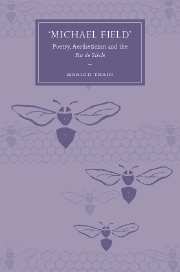Book contents
- Frontmatter
- Contents
- Acknowledgements
- Introduction: ‘something fierce, subtle, strange, singular’
- 1 The diaries and dramas: life-writing and the temporal patterns of aestheticism
- 2 Long Ago: the male pseudonym, fin-de-siècle sexualities and Sappho's historical leap
- 3 Sight and Song: Botticelli and ekphrastic paradox
- 4 Underneath the Bough: dual authorship and lyric song
- 5 Wild Honey from Various Thyme: apian aestheticism and the lyric book collection
- 6 The Catholic poetry: the spiritual and historical ‘turn’ of the century
- Conclusion: modernism and the fin de siècle
- Notes
- Bibliography of material by Katharine Bradley and Edith Cooper
- General bibliography
- Index
- CAMBRIDGE STUDIES IN NINETEENTH-CENTURY LITERATURE AND CULTURE
6 - The Catholic poetry: the spiritual and historical ‘turn’ of the century
Published online by Cambridge University Press: 08 September 2009
- Frontmatter
- Contents
- Acknowledgements
- Introduction: ‘something fierce, subtle, strange, singular’
- 1 The diaries and dramas: life-writing and the temporal patterns of aestheticism
- 2 Long Ago: the male pseudonym, fin-de-siècle sexualities and Sappho's historical leap
- 3 Sight and Song: Botticelli and ekphrastic paradox
- 4 Underneath the Bough: dual authorship and lyric song
- 5 Wild Honey from Various Thyme: apian aestheticism and the lyric book collection
- 6 The Catholic poetry: the spiritual and historical ‘turn’ of the century
- Conclusion: modernism and the fin de siècle
- Notes
- Bibliography of material by Katharine Bradley and Edith Cooper
- General bibliography
- Index
- CAMBRIDGE STUDIES IN NINETEENTH-CENTURY LITERATURE AND CULTURE
Summary
For current critics of Michael Field's poetry, interest in the oeuvre ends when the two women convert to Catholicism. It is their joyous, pagan poetry, and their abandoned sensuality, that has generated the recent flurry of critical excitement. The poetry composed after the conversion is seen as embarrassingly florid, conventional and emotional. Angela Leighton, for example, writes that ‘Faith did not re-energise their poetry, but turned it, paradoxically, towards the very flaccid and flowery decadence which they had largely avoided before’. But this ‘conversion poetry’ – ignored also, for the most part, by contemporaneous critics – should not be dismissed so readily. It would be a mistake to let any exploration of Michael Field's aestheticism stop at the point where, at the start of the twentieth century, it challenges – and is challenged by – new-found religious belief. The dialectic between pagan and Catholic in the conversion poetry produces a dynamic as exhilarating as that found in the earlier work. In this regard, it helps to bear in mind Ellis Hanson's leading claim that ‘All the great works of decadent literature are conversion narratives’.
If Wild Honey represents the artistic achievement I claim for it in my previous chapter, there will inevitably be a tendency to see this as the zenith of Michael Field's poetic career, and the subsequent sacred verse as an artistic failure consequent on the primacy of devotion, rather than art, in their later lives.
- Type
- Chapter
- Information
- 'Michael Field'Poetry, Aestheticism and the Fin de Siècle, pp. 168 - 200Publisher: Cambridge University PressPrint publication year: 2007



